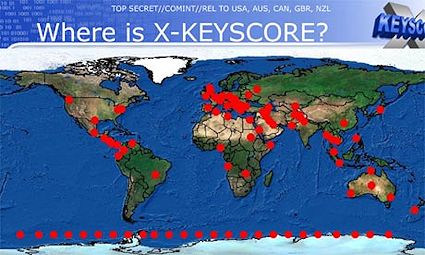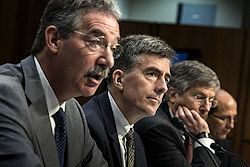 |
| One presentation claims the XKeyscore program covers 'nearly everything a typical user does on the internet' |
 |
| Representatives from the intelligence community defended the mass surveillance of phone records in a Senate hearing Wednesday |
The “Snowden Effect” was in full force on Wednesday as, almost simultaneously, 1) The Guardian released a new report on “X-Keyscore”
— the NSA’s search engine for its massive database of emails, chats and
other Internet activity; 2) the Director of National Intelligence declassified
documents about its bulk collection of phone and email metadata and an
example of the court authorization to collect, store and query that
data; and 3) the Senate Judiciary Committee questioned members
of the intelligence community about the exact nature of these programs
and whether they’re worth the invasion of Americans’ privacy. The change
in information access since the Edward Snowden leaks is dramatic.
Watchdogs who have long had their ears pressed to the ground trying to
make out the secretive moves of the intel community are now instead at a
festival with multiple stages.
Glenn Greenwald at the Guardian holds up a 2008 Powerpoint presentation about the X-Keyscore program – which he published nearly in full — as proof that any NSA analyst, including Edward Snowden, could easily query a massive NSA database that holds “nearly everything a user does on the Internet.”
Sample searches include looking for intel by email address, phone
number, files looked at, search terms used, or even cookies on a
person’s computer. A slide on “ finding targets” suggests might put a
person in the NSA’s crosshairs: someone “whose language is out of place
for the region they are in,” “someone using encryption,” and “someone
searching the web for suspicious stuff.” (The presentation again
reinforces that anyone going to extreme measures to protect their
privacy becomes a target, with use of encryption and VPN mentioned as
reasons to seek information on someone.) The Powerpoint looks much like
one worked up by a database vendor for a Big Data conference — but with
much more references to jihad, Iraq and Osama Bin Laden. It claims “300
terrorists captured” based on intel from the tool.
 |
| NSA Director Heckled At Conference As He Asks For Security Community's Understanding |
The X-Keyscore program did not come up explicitly during the Senate
Judiciary Committee hearing, though Sen. Patrick Leahy did make an aside
about it to Sen. Diane Feinstein, noting that it “might or might not be
accurate.” Instead the hearing focused on whether bulk collection of
millions of people’s phone records is actually necessary to catch
terrorists. In advance of the hearing, the Director of National
Intelligence James Clapper released documents
from 2009 and 2011 that include an all-caps note that “publicly
disclosing any of this information would be expected to cause
exceptionally grave damage to our nation’s intelligence capabilities and
to national security” (So much for that) as well as a July 2013 FISA court order outlining how the NSA can get, store, and search business records data in an unnamed case.
“ODNI knew this hearing was coming for weeks but declassified this
material minutes before it started,” complained Sen. Al Franken to the
agency’s lawyer Robert Litt, who said the agency had met with the
Executive Branch the night before to make the call. “You might have
thought about this weeks ago instead of the day of,” replied a peeved
Franken. Franken said he planned to introduce legislation that would
force more transparency on how the NSA surveillance programs operate.
Last week, an amendment in the House to curb NSA surveillance of phone
records was narrowly defeated.
Senator Leahy pushed hard on the witnesses to identify how often the
bulk collection of phone records has been key to disrupting a terrorist
plot.
“I reviewed all the classified material the NSA sent and I am far
from convinced that section 215 helped to thwart or prevent 54 terrorist
plots,” said Patrick Leahy, referencing a number put forth by NSA head
Keith Alexander.
NSA deputy director John Inglis responded that 13 of those plots had a
“homeland nexus” (i.e., were going to happen in the U.S.) and in 12 of
them, Section 215 — which allows bulk collection of business records
including phone calls — “made a contribution.” He said he only one was a
“but for” case, pointing to a plot to bomb a New York subway station, a
claim that has been challenged before.
Inglis said that after hearing Najibullah Zazi talking on the phone
about the plot, the NSA provided a number of a co-conspirator that
investigators had been unaware of.
The senators expressed concern about how many people might be sucked
into an investigation if intel analysts are doing two or three hops from
their main target. As Shane Harris at Foreign Policy has written, that
could easily include millions of people.
Inglis said they “try to be judicious” and that when there is a
second hop or third hop, they “may only do that for a subset of
numbers.” If a “pizza deliveryman” is included in one of those hops,
“you don’t go after that,” he said.
In most cases, the bulk metadata like phone call records isn’t all
that valuable on its own, said FBI deputy director Sean Joyce, but it
“plays a crucial role in closing the seams” in investigations.
Some of the senators remained skeptical, even security hawk Leahy.
“We could have more security if we strip searched everybody entering
every building. We’re not going to do that,” he said. “We’d have more
security if we were to wiretap every phone and search every home. We’re
not going to do that. Americans expect a certain amount of privacy.”
“If this program is not effective it has to end,” Leahy said. “So far I’m not convinced by what I’ve seen.”
Glenn Greenwald's report in The Guardian
Source: Forbes
|

